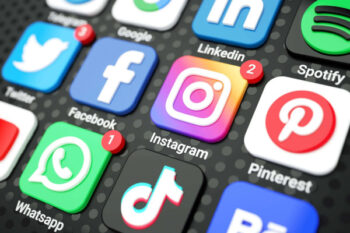By Amelia Harris
Staff Writer for Wake Up World
Social media has become a ubiquitous part of our daily lives, allowing us to connect with others, stay informed, and share our experiences. While it has its benefits, there is growing concern about the negative impact of social media on our mental health. Research has shown that prolonged use of social media can lead to a range of negative emotions, including anxiety, depression, and loneliness. The constant barrage of information and stimuli can also make it difficult to switch off and relax, leading to a sense of mental overload and burnout.
So it’s high time we explore the darker side of social media and examine the latest research on its impact on our mental well-being. It’s important to understand how social comparison on social media affects our mental health, as well as the impact of sleep disruption caused by the blue light emitted by screens. But of course, social media can also be a wonderful thing – if you know how to use it in a healthy and responsible way, minimizing the risk of negative mental health effects. By understanding the potential risks of social media and taking steps to mitigate them, we can make the most of this powerful tool while safeguarding our mental health and well-being.
The Impact of Social Media on Mental Health
Numerous studies have linked social media use with mental health problems such as depression, anxiety, and loneliness [1]. One study found that heavy social media use was associated with increased feelings of social isolation [2], while another study found that people who spend more time on social media are more likely to experience symptoms of depression [3].
The constant barrage of curated images and perfect lives presented on social media can lead to unrealistic expectations and feelings of inadequacy, which can negatively impact our self-esteem and mental health [4]. In addition, the fear of missing out (FOMO) can also lead to anxiety and stress, as users constantly compare themselves to others and feel pressured to keep up [5].
The Role of Social Comparison
Social comparison theory suggests that we evaluate ourselves by comparing ourselves to others [6]. On social media, this often means comparing our lives to the highlight reels of others, leading to feelings of envy and dissatisfaction with our own lives [7]. This can be particularly damaging for young people, who are still developing their sense of self and are more likely to compare themselves to others [8].
In today’s digital age, social media has become an integral part of our lives, with millions of people using it on a daily basis to connect with others and share their experiences. While it has its advantages, there is growing concern about the negative impact of social media on our mental health, with studies suggesting that it can lead to feelings of anxiety, depression, and loneliness [1]. One of the main reasons for this is the phenomenon of social comparison theory, which suggests that we evaluate ourselves by comparing ourselves to others [6]. On social media, this often means comparing our lives to the highlight reels of others, which can lead to feelings of envy and dissatisfaction with our own lives [7]. This is particularly problematic for young people, who are still developing their sense of self and are more likely to compare themselves to others [8]. In this article, we’ll explore the dark side of social media and how it’s affecting our mental well-being. We’ll delve into the research on the negative impact of social media on mental health and the specific ways in which it can harm our well-being. We’ll also discuss some tips for using social media in a healthier way, so that we can all enjoy its benefits without sacrificing our mental health.
The Negative Effects of Social Media on Sleep
Another way social media can impact our mental health is through its effects on sleep. The blue light emitted by electronic devices can disrupt the production of melatonin, a hormone that regulates sleep [9]. This can lead to sleep problems such as insomnia, which is linked to numerous mental health problems, including depression and anxiety [10].
In addition, the constant stimulation of social media can make it difficult to wind down and relax before bed, further exacerbating sleep problems [11]. A lack of quality sleep can impact our mood, cognitive function, and overall well-being [12].
Conclusion
While social media has its benefits, it’s important to recognize the negative impact it can have on our mental health. The constant comparisons, FOMO, and lack of sleep associated with social media use can lead to feelings of isolation, depression, and anxiety. As with any aspect of our lives, moderation is key. By setting healthy boundaries and being mindful of our social media use, we can reduce the negative impact on our mental well-being.
References
[1] Woods, H. C., & Scott, H. (2016). #Sleepyteens: Social media use in adolescence is associated with poor sleep quality, anxiety, depression and low self-esteem. Journal of adolescence, 51, 41-49. https://pubmed.ncbi.nlm.nih.gov/27294324/
[2] Primack, B. A., Shensa, A., Escobar-Viera, C. G., Barrett, E. L., Sidani, J. E., Colditz, J. B., … & James, A. E. (2017). Use of multiple social media platforms and symptoms of depression and anxiety: A nationally-representative study among US young adults. Computers in Human Behavior, 69, 1-9. https://psycnet.apa.org/record/2017-05034-002
[3] Lin, L. Y., Sidani, J. E., Shensa, A., Radovic, A., Miller, E., Colditz, J. B., Primack, B. A. (2016). Association between social media use and depression among US young adults. Depression and anxiety, 33(4), 323-331. https://pubmed.ncbi.nlm.nih.gov/26783723/
[4] Vogel, E. A., Rose, J. P., Roberts, L. R., & Eckles, K. (2014). Social comparison, social media, and self-esteem. Psychology of popular media culture, 3(4), 206. https://psycnet.apa.org/record/2014-33471-001
[5] Tandoc Jr, E. C., Ferrucci, P., & Duffy, M. (2015). Facebook use, envy, and depression among college students: Is Facebooking depressing?. Computers in Human Behavior, 43, 139-146. https://psycnet.apa.org/record/2014-55177-016
[6] Festinger, L. (1954). A theory of social comparison processes. Human relations, 7(2), 117-140. https://journals.sagepub.com/doi/10.1177/001872675400700202
[7] Fardouly, J., Diedrichs, P. C., Vartanian, L. R., & Halliwell, E. (2015). Social comparisons on social media: the impact of Facebook on young women’s body image concerns and mood. Body image, 13, 38-45. https://pubmed.ncbi.nlm.nih.gov/25615425/
[8] Moreno, M. A., Jelenchick, L. A., Egan, K. G., Cox, E., Young, H., Gannon, K. E., & Becker, T. (2011). Feeling bad on Facebook: depression disclosures by college students on a social networking site. Depression and anxiety, 28(6), 447-455. https://www.ncbi.nlm.nih.gov/pmc/articles/PMC3110617/
[9] Chang, A. M., Aeschbach, D., Duffy, J. F., & Czeisler, C. A. (2015). Evening use of light-emitting eReaders negatively affects sleep, circadian timing, and next-morning alertness. Proceedings of the National Academy of Sciences, 112(4), 1232-1237. https://pubmed.ncbi.nlm.nih.gov/25535358/
[10] Baglioni, C., Battagliese, G., Feige, B., Spiegelhalder, K., Nissen, C., Voderholzer, U., … & Riemann, D. (2011). Insomnia as a predictor of depression: a meta-analytic evaluation of longitudinal epidemiological studies. Journal of affective disorders, 135(1-3), 10-19. https://pubmed.ncbi.nlm.nih.gov/21300408/
[11] Kross, E., Verduyn, P., Demiralp, E., Park, J., Lee, D. S., Lin, N., … & Ybarra, O. (2013). Facebook use predicts declines in subjective well-being in young adults. PloS one, 8(8), e69841. https://journals.plos.org/plosone/article?id=10.1371/journal.pone.0069841
[12] Grandner, M. A., Jackson, N. J., Pak, V. M., & Gehrman, P. R. (2012). Sleep disturbance is associated with cardiovascular and metabolic disorders. Journal of sleep research, 21(4), 427-433. https://pubmed.ncbi.nlm.nih.gov/22151079/
About the author:
Amelia Harris is a writer and eco-activist, interested in health and all things esoteric, with a passion for sharing good news and inspiring stories. She is a staff writer for Wake Up World.

If you've ever found value in our articles, we'd greatly appreciate your support by purchasing Mindful Meditation Techniques for Kids - A Practical Guide for Adults to Empower Kids with the Gift of Inner Peace and Resilience for Life.
In the spirit of mindfulness, we encourage you to choose the paperback version. Delve into its pages away from screen glare and notifications, allowing yourself to fully immerse in the transformative practices within. The physical book enriches the learning process and serves as a tangible commitment to mindfulness, easily shared among family and friends.
Over the past few years, Wake Up World has faced significant online censorship, impacting our financial ability to stay online. Instead of soliciting donations, we're exploring win-win solutions with our readers to remain financially viable. Moving into book publishing, we hope to secure ongoing funds to continue our mission. With over 8,500 articles published in the past 13 years, we are committed to keeping our content free and accessible to everyone, without resorting to a paywall.








